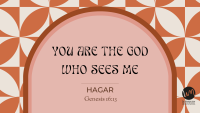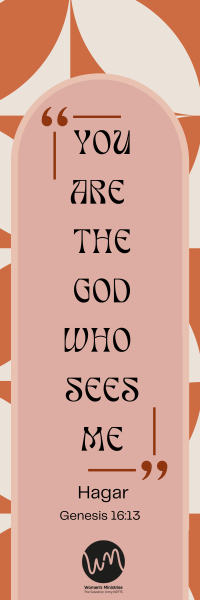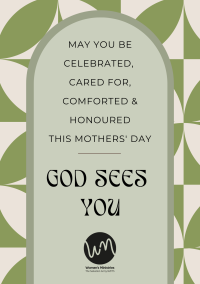You are here
The Hagar Series
(This was originally published for Mother's Day 2023, but can be used at any time - download resources below)
In the ancient days, where women's names were rarely recorded, God sees and names the woman Hagar. But, as always with God, he does not bestow his favour on the powerful. Hagar is not only a woman, she is a slave from the household of Abram and Sarai. She has been forced to escape her abusive household and finds herself pregnant and homeless, in the wilderness. In despair, she stops to rest at a well, the source of life.
Jewish-Christian tradition places Abram and Sarai as our heroes - 'the main characters' - who are the founders of the Jewish nation. Yet, Hagar is the woman who is visited by the presence of God and called by name: “Hagar, slave of Sarai, where have you come from, and where are you going?” (Gen. 16:8).
Remarkably, God makes the same promise to Hagar that he had made to Abram and Sarai: “I will increase your descendants so much that they will be too numerous to count” (Gen. 16:9).
Hagar responds with this intimate portrayal of God' ever-present help: “You are the God who sees me… I have now seen the One who sees me” (Gen. 16:13).
'Hagar enters a relationship with God that reshapes her identity and her perspective of her circumstance. She is no longer just a slave, but an heir to God’s promise,' writes Amy R. Buckley. 'Hagar—the only person in Bible history to give a name to God—discovers that God sees and hears abused women. She spreads word of the God she has met beside the well. Her experience at the well becomes so widely known that, in time, the well comes to be called Beer Lahai Roi, meaning “spring of the living one who sees me.” Acting in faith, Hagar returns to Abram and Sarai’s household with a different perspective.'
This following has been written as a liturgical prayer for Mother's Day, where a leader reads the text, and the congregation can join in the refrain (in bold): 'God sees you.'
A prayer for women and mothers
We celebrate our mothers today. You have gone through long nights and loud laughter. You have provided quiet comfort and joyful nurture. In the calm and in the chaos,
God sees you.
We grieve with mothers today. If you have lost children through miscarriage, death or broken relationships,
God sees you.
We stand alongside women today who long to be mothers. When your prayers have not yet been answered,
God sees you.
We mourn with the children of mothers today. If you didn't have the mum you needed, when the trauma, abuse and neglect comes flooding back,
God sees you.
We take comfort in the words of scripture that describe God as a loving mother who protects, cares for and nurtures her children.
May you be comforted, cared for and celebrated by the mother heart of God today.
God sees you.
Find out more:
Read a full commentary on Hagar and The God Who Sees
See our Motherheart of God Series - from Mothers' Day 2022
Watch this podcast about the the fascinating origins of the day: Is Mother's Day Relevant of a Relic?
Download the 'Hagar Mothers' Day Series' below ...
Watch our 'Prayer for Mothers' as a video.
This can simply be viewed, or could be led as a liturgical prayer - with a leader reading, and the congregation joining in on the refrain 'God sees you'.
This is also available as a PDF, which can be printed or used as digital slides.
Watch this stunning performance by Chantelle Lindsey, where reimagined lyrics that support and empower women, are set to the familiar tune of 'Be Thou My Vision'.



